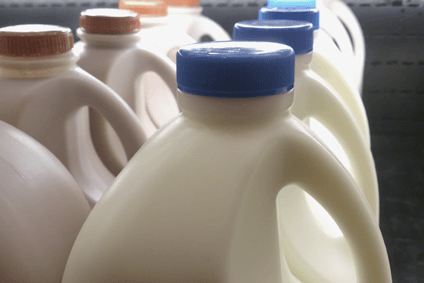
Dairy Crest chief executive Mark Allen said today (21 May) he is "confident" the group's disposal of its struggling dairies business to Muller Wiseman Dairies will gain competition approval. The group's full-year results, released earlier this morning, show exactly why this sale is vital to Dairy Crest's performance.
Dairy Crest booked a steep decline in full-year earnings today (21 May). Net profit for the year to 31 March declined to GBP20.5m (US$32.1m) versus GBP50.2m in 2014. Operating profit slid to GBP32m from GBP64.3m a year earlier.

Discover B2B Marketing That Performs
Combine business intelligence and editorial excellence to reach engaged professionals across 36 leading media platforms.
Much of the fall can be attributed to Dairy Crest's struggling liquid milk business, with dairies operating profit dropping 90% year-on-year. The company is therefore pinning its hopes for an improved medium-term outlook on plans to sell off the dairies unit to Muller Wiseman Dairies for GBP80m.
The disposal will allow Dairy Crest to reduce its exposure to low-margin liquid milk sales and focus its energies on better-performing parts of its business. The company is zoning in on cheese, spreads and whey revenue streams. For its part, Muller Wiserman Dairies, part of Germany's Muller, believes that an increased market share will strengthen its hand in UK liquid milk, a sector under pressure from fierce pressure on pricing.
However, the acquisition would mean the UK liquid milk sector only had two major milk suppliers – Muller and Arla Foods – instead of the current three. The transaction remains subject to regulatory approval and the UK's competition watchdog is still probing the deal.
Speaking after the release of Dairy Crest's results today, chief executive Mark Allen was upbeat on the likelihood that the sale would be approved. "We're on track. It's been referred back to the UK from Europe, and we expect to hear in the next few weeks the result of phase one [of the investigation]. It may go to phase two. If it does, I don't think that changes our opinion. We're absolutely committed and convinced that this deal will go through," he insisted.

US Tariffs are shifting - will you react or anticipate?
Don’t let policy changes catch you off guard. Stay proactive with real-time data and expert analysis.
By GlobalDataHowever, Shore Capital analyst Darren Shirley said the pending competition approval created a degree of "uncertainty" over Dairy Crest's prospects. "Management has again reiterated its expectation that the proposed disposal of its dairies activities will gain regulatory approval – it already has shareholder approval – though the process could well take another six months to clear, placing ongoing uncertainty around the stock for some time," he wrote in a note to investors.
If the sale fails to gain competition approval, Dairy Crest will see dairies continue to weigh on its operating results, with little prospect of improved conditions in the UK market for liquid milk. In this scenario, Dairy Crest would continue to focus on lowering its cost base and reducing its reliance on low-margin areas, Allen continued.
"We're confident that the transaction will go through. But it is good management practice to have a reserve position. Now a reserve position is ‘Plan B’, which is pretty much what we've been doing over the last few years, reducing our exposure to the loss-making parts of this business. That process will continue," he commented.
Jefferies analyst Alex Howson took positive view of the sale process, which he believes is likely to yield a favourable result for Dairy Crest. "We note that the underlying losses in dairies were greater than anticipated, but the divestment of this business is likely to be approved eventually, in our view, and investors should rather focus on the business that will be retained," he suggested.
Outside liquid milk, Dairy Crest reported a 19% rise in operating profit at its core food businesses, spreads and cheese. Profits were boosted by higher cream prices at the unit. The group also reported sales growth led by the Cathedral City cheese brand, which offset a 4.2% drop in spreads sales.
The company did "okay" in the lacklustre spreads category, Allen suggested. "The whole butter and spreads market is tough for us. People look for different formats. They move away from sandwiches to wraps, etcetera. But we're actually performing okay. Clover is performing in line with the market. And in Butter, our butter brand Country Life is actually doing very well in spreadable, it's outperforming the market."
However, the chief executive conceded that Dairy Crest continues to "under-perform" in the block sector. "That is a direct result of some of the decisions we made in the business during the year. We chose to promote less and therefore reduce sales so that we could sell cream and make more profit. I think the end result of that is our spreads business had a fabulous year from a profitability point of view, but actually, the brand share was lower than we would have ideally liked."
If the dairies sale goes ahead without a hitch it will remove one troublesome area for Dairy Crest. However, the company also has more work to do in the spreads arena. The sooner attention can be fully focused on this challenge, the better for Dairy Crest's outlook.





